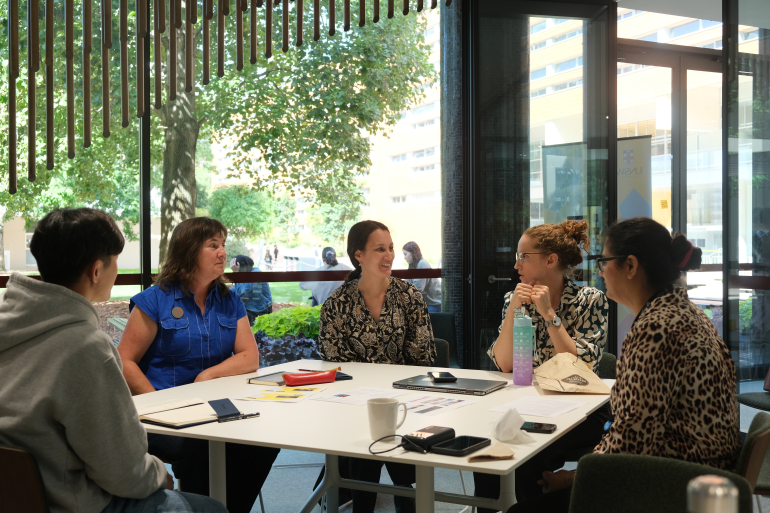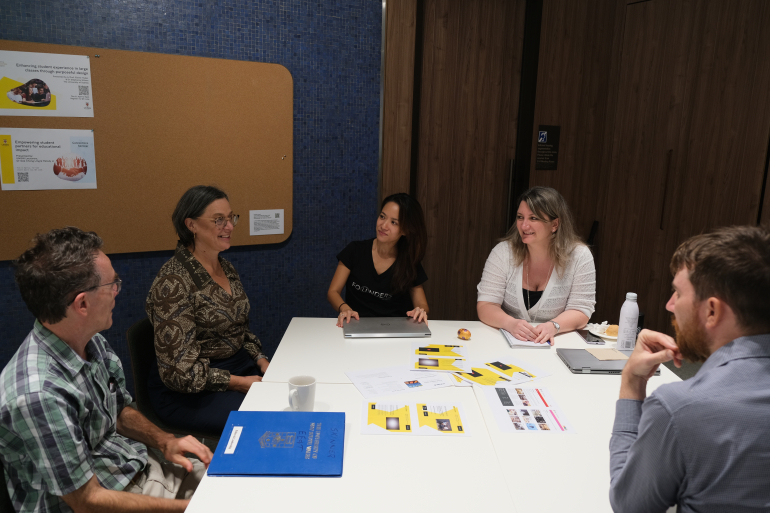By Apple Davalos, Senior Engagement Officer, UNSW Education Focussed Development Program
Published 24 April 2024
Earlier this month, I had the privilege of attending the ‘Sydney Basin Symposium on Transdisciplinary Student Projects’, as part of UNSW’s Education Focussed (EF) Visiting Teaching Fellowship event series. This event gathered a cross-section of educators and professionals to discuss the integration of various academic disciplines within engineering education and its potential to transform pedagogical approaches, preparing students to navigate and tackle global societal challenges.
A new approach to engineering education
The symposium commenced with a keynote from Associate Professor Irina Lazar, an EF Visiting Teaching Fellow from University College London (UCL). A/Prof Lazar introduced UCL's innovative Bachelor of Science program in Science and Engineering for Social Change, which exemplifies a departure from traditional engineering curricula by incorporating social sciences. This program reflects a holistic educational approach, emphasising the synergy between engineering solutions and societal needs, a path A/Prof Lazar herself navigated from civil to mechanical engineering and subsequently into public policy.
Her reflection on the challenges and successes of implementing such a curriculum provided a candid and invaluable perspective for educators aspiring to integrate similar models into their Schools and Faculties.
Transdisciplinary education in practice
Further illustrating transdisciplinary approaches, Associate Professor Lauren Kark presented on the UNSW Assistive Technology Hub (AT Hub). This initiative showcases the significant societal impacts achievable when engineering education aligns with humanitarian objectives. Students collaborate directly with end-users to create tailored solutions, such as adaptive devices for athletes and bespoke musical instruments for artists with physical challenges. The AT Hub underscores a philosophy that breaks away from conventional academic projects. It is not about creating technology for the sake of technology but about meeting genuine needs that foster inclusion and participation. These student projects clearly demonstrate that when guided by empathy and collaboration, engineering can produce transformative outcomes for individuals and communities alike and touch lives in the most meaningful ways.
For A/Prof Kark,
"It's often as engineers, we like to push technology rather than be pulled by a need. And I was very keen to try and break that cycle in our future engineers in that we should be working on something that has societal benefit, and so all our projects in the AT Hub are determined and defined by end users.”
Strategic frameworks for complex challenges
UNSW Professor Rita Henderson introduced the Theory of Change to outline how structured thinking can guide engineering projects to achieve significant social impact. This framework helps in planning and executing projects that extend beyond traditional engineering boundaries to address broader societal issues. Prof. Henderson’s discussion was a guide for embedding such strategic frameworks within engineering education to enhance the impact and relevance of student projects.
Inclusivity in innovation
The importance of creating accessible and inclusive makerspaces was emphasised by Melinda Wimborne, UNSW Makerspace Network Manager. These spaces are designed to encourage students from all disciplines to collaborate, innovate, and materialise their ideas into tangible prototypes—democratising access to essential tools and resources that facilitate creative problem-solving.
Fostering entrepreneurial mindsets
The session by Priscilla Tan, Prototypes Manager at UNSW Founders highlighted the integration of entrepreneurial thinking within a transdisciplinary educational framework. This initiative encourages students to extend their problem-solving capabilities beyond traditional engineering solutions by incorporating elements from business and social sciences, preparing them to tackle global challenges through innovative ventures.
A paradigm shift in engineering education
Dr May Lim, UNSW Nexus Fellow from the School of Chemical Engineering, aptly synthesised the discussions from the workshop she facilitated after the presentations. She articulated that the challenge today is not merely the adoption of new technologies but fundamentally altering how these technologies are integrated into learning processes to make them genuinely effective and inclusive. By emphasising the importance of teaching students not just to seek correct answers but to explore multiple solutions through real-world projects, she highlighted a shift from traditional teaching to a more project-based approach.
Her synthesis encapsulated the symposium’s collective aspiration to cultivate a transdisciplinary approach that not only broadens students' academic horizons but also equips them with the skills to navigate and address complex challenges.
Conclusion: forward trajectory
Reflecting on the symposium's discussions, it is evident that the future of engineering education lies in dismantling disciplinary silos. For educators, the challenge is to assimilate these insights into teaching methodologies, fostering an environment where future engineers are equipped not only as problem solvers but as innovators and empathetic leaders capable of making significant societal contributions. The dialogues at the Sydney Basin Symposium have reinforced my belief in the transformative potential of transdisciplinary approaches in engineering education, which enrich the learning experience and better prepare students to address the complexities of real-world problems.
Read other UNSW Education blogs or submit your own
***
Reading this on mobile? Scroll down to learn about the author.







